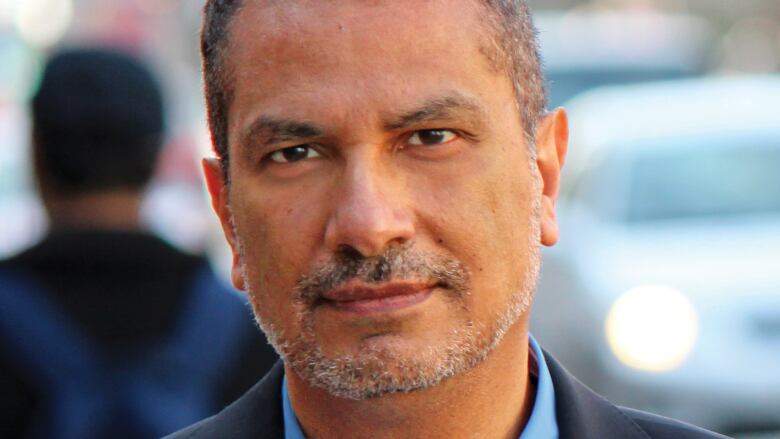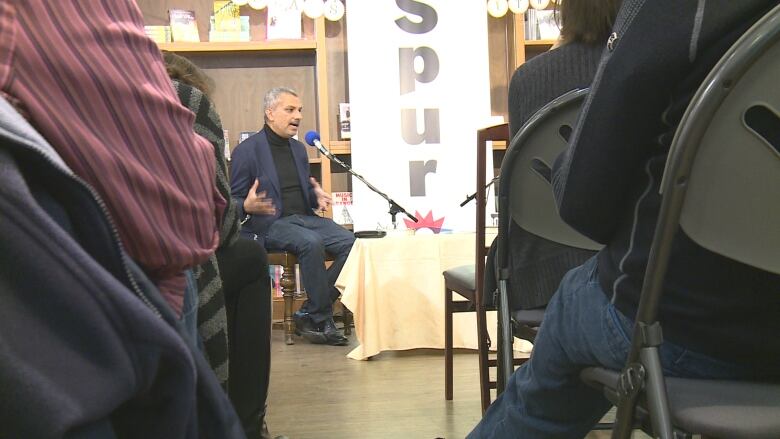Author Kamal Al-Solaylee 'absolutely honoured' to be Kitchener Public Libary's writer in residence
'Stories are powerful and stories are elemental,' Al-Solaylee says

Kamal Al-Solaylee is this year's writer in residence at Kitchener Public Library and will be hosting both one-on-one meetings with new authors as well as some public lectures.
He is the author of Intolerable: A Memoir of Extremes, which won the 2013 Toronto Book Award and was a finalist for the CBC's Canada Reads, and Brown: What Being Brown in the World Today Means (to Everyone), which wasnominated for the Governor General's Literary Awards for Nonfiction, the Trillium Book Award and won the Shaughnessy Cohen Prize for Political Writing.
He spoke with CBC Kitchener-Waterloo's The Morning Edition host Craig Norris on Friday about his books, how they fit into a world where many people are learning more about the experiences of other people, and his upcoming work in his role at KPL.
This interview has been edited for length and clarity. You can listen to the full interview at the bottom of this story.
Craig Norris: In your role as writer in residence, you will meet one-on-one with some local unpublished authors. What do you think are going to be talking about? What sort of advice will you be offering them?
Kamal Al-Solaylee: Well, the focus of this year's Kitchener Public Library's writer in residence program is non-fiction, is the kind of work that I do, which is sort of long form magazine writing personal essays or nonfiction books.
So you said young writers, but I welcome writers of any age who are just starting out and would like to explore that world. And I think at the end, the understanding is that they'll send us samples of their work and I will critique them or give them guidance on how to get them published.
Norris: I just want to let everyone know that they're going to be accepting applications from Monday, Nov. 2 at 9:00 a.m. until Nov. 16 at 7:00 p.m. So if people want to get in there.
Al-Solaylee: That's right. Yes. I think there are 30 spots available and the consultations, depending on where we are with the pandemic, might be in person or might be online.
Norris: What does it mean to you, Kamal, to hold this kind of position at the Kitchener Public Library?
Al-Solaylee: Oh, I'm absolutely honoured. I was actually one of the finalists for the Edna Staebler Award for nonfiction in 2015 for my first book. I didn't win. But it was, I mean, literally it was just just such an honour to be nominated and to be back at the Kitchener-Waterloo area.
My very first teaching job was at [the University of Waterloo] in the drama department, because I used to be a theater critic at the Globe and Mail and I taught modern drama and criticism.
I have such a strong affinity for the area. So my only regret is we're doing the lectures and likely doing the consultations online instead of being with everyone in the room.

Norris: Your work has been hailed by critics. You wrote a memoir called Intolerable: A Memoir of Extremes and your book, Brown: What Being Brown in the World Today Means to Everyone. Where do you see those two books fitting into the sort of year that we've been having, with so much discussion about learning about experiences of people who are different than ourselves?
Al-Solaylee: I see Brown particularly to be, I mean, I'd like to think it is particularly relevant at this moment because, even though it was mostly written in 2014 and 2015 and published in 2016, it was a book that sort of explained many things that we're experiencing now.
For example, why do racialized minorities tend to work in very low paid and labour intensive jobs? And, for example, they tend to be more vulnerable to the coronavirus or, for example, the kind of the roots of white nationalism or white supremacy that now we see in full effect in American politics.
So it was the beginning, the book sort of traces the roots of many things that have now come into full view.
Norris: This year, we've seen many people turning to books, trying to learn and garner some knowledge about the experience of others. We've seen indigenous history books pick up people of colour, the black experience. Why, Kamal, do you think books play such a crucial role for so many in that education?
Al-Solaylee: Stories are powerful and stories are elemental. Like we as human beings have been telling stories since the dawn of time. And I think there's sometimes comfort, but there's also challenges in reading and writing stories.
And this is why the writer in residence program that I'm in is trying to encourage people because I genuinely believe everyone has a good story and everyone can identify a good story and tell a good story. They just need the training to tell it.
Norris: I want to touch on some of the upcoming lectures that you're going to be hosting. Let's just focus on next week's. What can you tell us?
Al-Solaylee: Next week is where we work on how to build a complete sort of short and mid-sized magazine feature, narrative-driven magazine feature. Features that would have a strong character, narrative, conflict that are also based on reporting, but also will tend to be stories about people in difficult situations or in challenging situations.
So the focus is really on storytelling, how to improve your skill as a storytelling using non-fiction. So it has to be factual, it has to be verifiable, and you have to actually talk to people in order to get the stories out of them.
Norris: Just really briefly, some of the other ones, I like The Me in Memoir on Nov. 12.
Al-Solaylee: That's right. I think, as you probably know, there's been a resurgence in personal writing, both in the magazines, but also in book form with memoirs and personal essays.
So I want to take [people] ... through that process and the focus in both sort of next week's lecture and that one is pretty much on the practical. It's on the how to.
This is kind of my approach to writing. I think you can read on your own and you can learn on your own, but let me guide you in how to do it. And the fun with the final lecture would be how to put a book proposal for a non-fiction title out in the world.
Listen to the full interview withKamal Al-Solaylee:












_(720p).jpg)


 OFFICIAL HD MUSIC VIDEO.jpg)
.jpg)



























































































